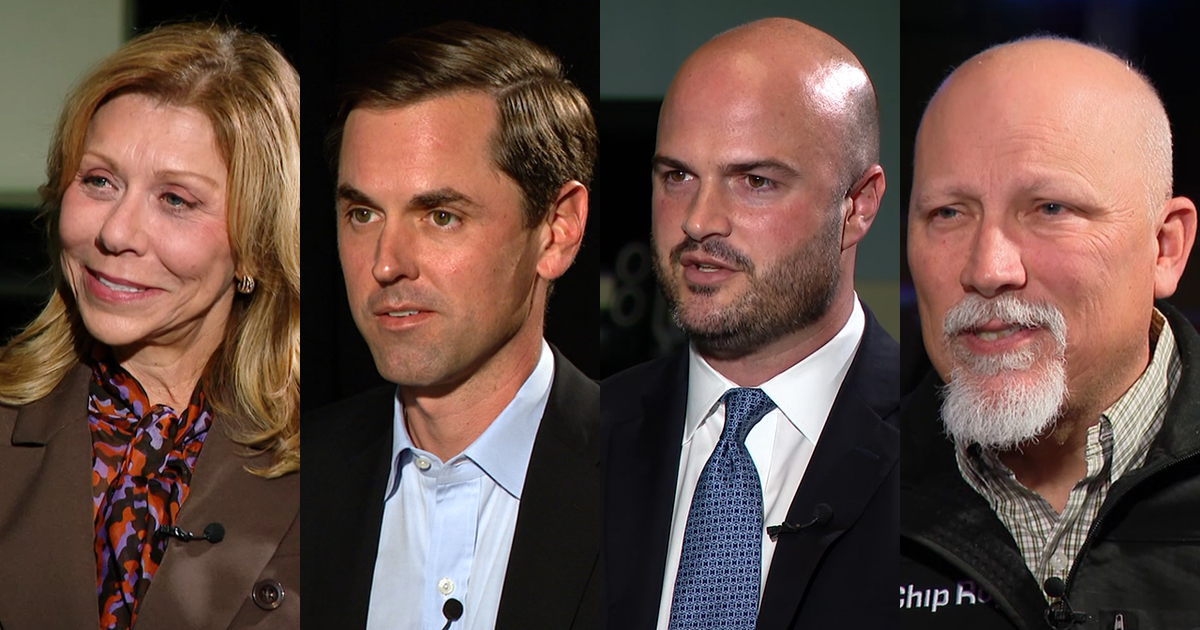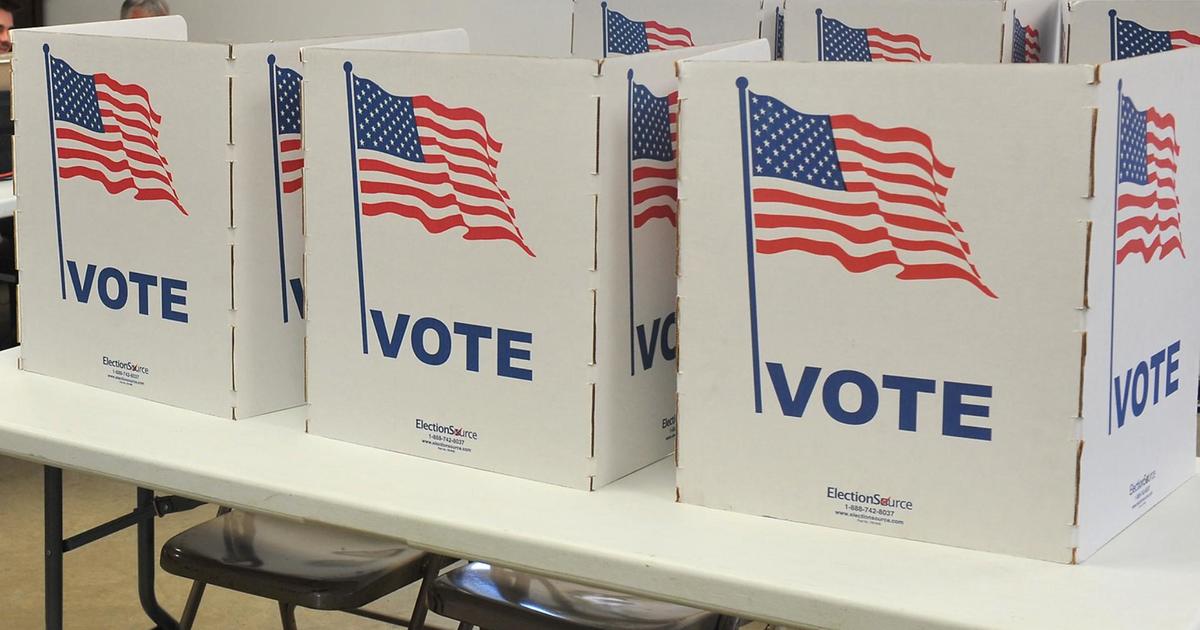How Andrew Yang looks to broaden support for his unconventional campaign
It took awhile for anyone to take Andrew Yang seriously.
When he first visited Iowa in August 2018, Yang and his small team drove around in a white, unmarked van. "When I said I was running for president, people were like 'president of what?'" Yang told a group of small business owners in Dubuque, Iowa on Saturday.
Now Yang travels the state in a massive charter bus with his name on it. When it parked in Dubuque over the weekend, four national news cameras were pointed in Yang's direction. "No one was here to cover the first Iowa trip, I'll tell you that," he said.
Sixteen months after arriving in the Hawkeye State as a virtual nobody, Yang will be one of seven candidates at Thursday's Democratic debate, alongside a former vice president and three sitting senators. And with Kamala Harris' departure from the race, he'll also be the only person of color on the stage.
His campaign has outlasted several prominent politicians with deep party ties. But Yang, who until earlier this year was an obscure businessman from New York City, says he's unsurprised that he's made it this far while also acknowledging he has his work cut out for him.
"I think we need to outperform expectations," Yang told CBS News, saying that most people still don't believe he will get "any meaningful number of delegates." He did say that a top five finish in Iowa "would surprise a lot people."
Despite being the only person of color to take the stage on Thursday, he's wary of criticizing primary process in the way former Housing Secretary Julián Castro has. Castro, a Mexican American, has repeatedly complained that the first two states to hold primary contests, Iowa and New Hampshire, are overwhelmingly white. The Democratic Party as a whole, meanwhile, is increasingly diverse and dependent on Hispanic and African American voters.
Instead of knocking the process, Yang repeatedly tells voters in Iowa and New Hampshire that they have the "power" to turn his longshot presidential bid into a reality. He regularly refers to both states as "magical" places.
"We should be open to people suggesting improvements, but one of the things that I'd suggest is that it's not enough to say 'hey, I don't like what's currently going on.' You have to have concrete suggestions as to what could work better and what that could look like," Yang told CBS News. He also doesn't believe that the Democratic National Committee should be faulted for the fact that he's the only minority candidate qualified for this week's debate.
"I think the DNC did the best they could with a very difficult task which is set up objective criteria that would raise the bar over time," he said, noting that Harris had qualified before suspending her presidential campaign earlier this month.
In the November CBS News Battleground Tracker poll, Yang was the top choice for just 1% of registered Iowa Democrats, although 10% said they were considering supporting him. Yang has just completed his 23rd visit to Iowa, although his campaign has largely focused on New Hampshire, a state that's historically friendly to underdog candidates, as his major breakout opportunity.
With the caucuses just seven weeks away, Yang spent his recent five-day bus tour attempting to expand his support beyond his incredibly loyal base, commonly referred to as the "Yang Gang." For one thing, he held several events with his wife Evelyn in an appeal to families that have been affected by autism.
Yang often talks about raising his eldest son Christopher, who has autism, and how hard Evelyn works to care for him while Yang is both on and off the trail. He argues that the current economy doesn't value her work and believes his signature "Freedom Dividend" proposal to give every American $1,000 per month addresses that problem.
"We need to rewrite the rules of this economy to work for human beings and those special needs families are at the forefront of this," Yang said at a rally focused on families and autism.
The event held inside a packed coffee house in University Heights was filled with families. They listened as Andrew and Evelyn Yang spoke about raising their son, creating incentives for companies to hire people with autism, sensitivity training for police and providing more resources for schools.
"We've all been collectively brainwashed to think that economic value and human value are the same things," Yang said. "And one of the traps that special needs families fall into is to say 'well if you had the right organization or employment opportunity then my son or daughter would be able to contribute.' And that is very true, but that should not be the point."
Yang could also get a boost from people who may not be able to caucus for him in February. His events are often attended by teenagers, some of whom won't be 18 by November 2020. He has appealed to them with the Freedom Dividend, his emphasis on technology and the dangers of artificial intelligence, the changing economy and climate change. Although unable to caucus for Yang, some of them encouraging their parents and grandparents to give him a shot.
"I'm here to see what Andrew Yang has to say about the future for our young people," said Kathy Chapman, 61, from Oelwein. She pointed toward her 13-year-old granddaughter and two of her friends sitting in the front row of Yang's town hall in Waterloo. "They're big on Andrew Yang," she said.
"I think he has such a positive attitude about the future and he touched on the things that I'm really concerned about," Chapman said after the town hall, the first political event she ever attended. Yang is "moving right up there to the top" of the list of candidates she's considering supporting in February, Chapman added.
Doug Ward, a 54-year-old from Iowa City who works at the University of Iowa bookstore, said his 15-year-old son Ferguson is a huge fan of Yang and pushed him to attend Yang's rally in Iowa City on Saturday night. He said he was "absolutely blown away" seeing Yang and believes he could be a viable candidate.
"I don't usually put that much weight in the eyewitness business, but today actually did resonate," Ward said. He plans to look into Yang more, but that South Bend Mayor Pete Buttigieg is his top choice at this point.
While some of the people giving Yang a look may not be sold yet, his events still feature many people decked out in Yang Gang t-shirts and hats, including some who traveled from neighboring states to see him. Supporters at his events include Democrats, some 2016 Trump voters, and people newly engaged in politics, like Tanner Jewett, a 26-year-old from Solon who works in nuclear power.
"It seems like he's the only one who's talking sense, like addressing the problems that are actually there," Jewett said after Yang's Iowa City rally. In an election where many Democrats are laser focused on finding someone who they think can beat President Trump, Jewett believes Yang may be the only one with a chance - if he can get there.
"I think it's going to be tough winning the nomination, but I think if he wins the nomination he'll definitely steamroll," Jewett said.



